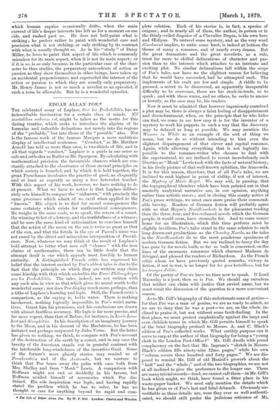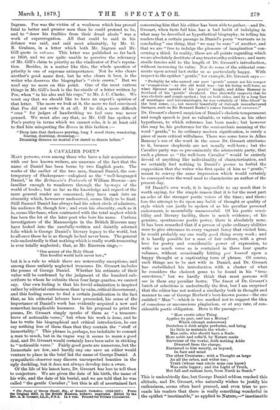EDGAR ALLAN POE.*
THE celebrated essay of Laplace, Sur les Probabilites, has an indescribable fascination for a certain class of minds. Nil morta2ibus arum est, might be taken as the motto for this daring treatise, which seeks to introduce the algebra of its formulas and inflexible deductions not merely into the regions of the "probable," but into those of the " possible " also. Nor is the famous work of the famous Marquis a mere ambitious display of intellectual acuteness. "Conduct," as Mr. Matthew Arnold has told us more than once, is two-thirds of life, and in all that regards "conduct," Laplace is a guide in one sense as safe and orthodox as Butler or Mr. Spurgeon. By calculating with mathematical precision the favourable chances which are con- stantly attached to the observance of those eternal principles on which society is founded, and by which it is held together, the great Frenchman inculcates the practice of good, as eloquently and at least as cogently as many a less heterodox teacher. With this aspect of his work, however, we have nothing to do at present. What we have to notice is that Laplace deliber- ately sets himself to conquer the "unknown," with precisely the same processes which admit of no cavil when applied to the "known." His object is to find for moral consequences the same certainty which exists for mathematical consequences. He weighs in the same scale, so to speak, the return of a comet. the winning ticket of a lottery, and the truthfulness of a witness ; . and he uses the same kind of ratiocination to convince himself that the action of the moon on the sea is twice as great as that of the sun, and that the fistula in the eye of Pascal's niece was not cured by the direct and miraculous interposition of Provid- ence. Now, whatever we may think of the result of Laplace's bold attempt to fetter what men call " chance " with the iron chains of mathematics, there can be little doubt that the attempt itself is one which appeals most forcibly to human curiosity. A distinguished French critic has expressed his belief that the interest excited by Poe's ablest tales is due to the fact that the principle on which they are written may claim some kinship with that which underlies the Essai Philosophique sur les Probabilites. The tales, indeed, are not written with any such aim in view as that which gives its moral worth to the wonderful essay ; nor does Poe display much more, perhaps, than a tithe of Laplace's learning and logic. Still, the French critic's comparison, as the saying is, holds water. There is nothing incoherent, nothing logically impossible, in Poe's weird narra- tives. Grant him his premisses, and his conclusions are drawn with almost faultless accuracy. His logic is far more precise, and far more cogent, than that of Balzac, for instance, in Louis Lam- bert and Seraphitiis. In his description of an imaginary journey to the Moon, and in his descent of the Maelstrom, he has been imitated and perhaps surpassed by Jules Verne. But the latter has given us nothing, we think, to compare with Poe's account of the destruction of the earth by a comet, and in any case the brevity of the American stands out in grateful contrast with the intolerable long-windedness of the inventive Gaul. Some of the former's more ghastly stories may remind us of Frankenstein and of the Anaconda, but we venture to -think that Poe bears away the palm with ease both from Mrs. Shelley and from " Monk " Lewis. A comparison with Hoffman might not end so decidedly in his favour, but Hoffman availed himself of accessories which Poe dis- dained. His sole inspiration was logic, and having rapidly stated the problem which he has to solve, he has no -thought or care for anything beyond its rapid and corn-
* The Life of Edgar AZ/an Poe. By W. F. GIB. London: Chatto and Windus.
plete solution. Each of his stories is, in fact, a species of enigma ; and in nearly all of them, the author, in person or in the thinly-veiled disguise of a Chevalier Dupin, is his own hero and CEdipus. To unravel some mystery, and as the very word cl4noilment implies, to untie some knot, is indeed at bottom the theme of many a romance, and of nearly every drama. But the great dramatists and the great novelists, as a rule, trust far more to skilful delineations of character and pas- sion than to the interest which attaches to an intricate and exciting plot. No similar delineations fall within the scope of Poe's tales, nor have we the slightest reason for believing that he would have succeeded, had he attempted such. The implements of his craft are few and simple. A riddle to be guessed, a secret to be discovered, an apparently insuperable difficulty to be overcome, these are his stock-in-trade, so to speak ; and with these wares,, and no others, he seeks to amuse or horrify, as the case may be, his readers.
Now it must be admitted that however ingeniously contrived a plot may be, there is always a faint feeling of disappointment and disenchantment, when, on the principle that he who hides can find, we come to see how easy it is for the inventor of a mystery to work his puppets in such a way that the discovery may be delayed as long as possible. We may mention the Woman in White as an example of the sort of thing we mean, but we do so without intending to hint even the slightest disparagement of that clever and capital romance. Again, while allowing everything that is not logically im- possible to the romance-writer who chooses to deal with the supernatural, we are inclined to resent incredulously such liberties as "Monk" Lewis took with the facts of natural history, in his lively picture of that well-known ophidian, the Anaconda. It is for this reason, therefore, that of all Poe's tales, we are inclined to rank highest in point of ability, if not of interest, the Mystery of Marie .Roget. We may add, in passing, that the topographical blunders which have been pointed out in that masterly analytical narrative are, in our opinion, anything rather than artistic errors ; and in closing this scanty notice of Poe's prose writings, we must once more praise their commend- able brevity. Readers of German fiction will probably agree with us that Heyse's Novellenschatz is far pleasanter reading than the three, four, and five-volumed novels which the German people, it would seem, have stomachs for. And to come nearer home for an illustration, which this time perforce must be slightly invidious, Poe's tales stand in the same relation to such long drawn-out productions as the Cheveley Novels, as the tales in the Novellenschatz do to the most ponderous specimens of modern German fiction. But we are inclined to fancy the day has gone by for novels built, so far as bulk is concerned, on the lines of the enormous romances which charmed Madame de Sevigne, and pleased the readers of Richardson. As the French critic whom we have previously quoted remarks, victory in fiction, if not in war, is no longer for les anis bataillons, but for les troupes d'elite.
Of the poetry of Poe we have no time now to speak. If Lord Macaulay is a poet, then so is Poe. We should say ourselves that neither can claim with justice that envied name, but we must remit the discussion of the question to a more convenient season.
As to Mr. Gill's biography of this unfortunate man of genius— for that Poe was a man of genius, we are as ready to admit, as we are to deny that he was a poet—we are, on the whole, in- clined to praise it, but not without some fault-finding. In the first place, we must protest emphatically against the inept and even childish terms in which Mr. Gill permits himself to speak of the brief biography prefixed to Messrs. A. and C. Black's edition of Poe's collected works. What earthly purpose can it serve to carp at the author of that biography for being a "young clerk in the London Post-Office ?" Mr. Gill dwells with proud complacency on the fact that Mr. Ingram's "sketch in Messrs- Black's edition fills ninety-nine 12mo. pages," while his own " volume covers three hundred and forty pages." We are dis- posed to remind Mr. Gill of old Hesiod's proverb about the " half " and the "whole ;" and of the two biographies, we are not at all inclined to give the preference to the longer one. There are many trivial records—fond, we cannot call them—in Mr. Gill's book which might, we think, have found a fitter place in his waste-paper basket. We need only mention the details which he has given us of Poe's last and fatal debauch. Obviously un- verifiable as these details are, were they ever so well authenti- cated, we should still prefer the judicious reticence of Mr. Ingram. Poe was the victim of a weakness which has proved fatal to better and greater men than he could pretend to be, and to "draw his frailties from their dread abode" was a work of supererogation. All that could be said, in his defence was said, and said most admirably, by Mr. G. R. Graham, in a letter which both Mr. Ingram and Mr. Gill quote in extenso. This letter was published. so far back as 1850, and we are quite unable to perceive the relevancy of Mr. Gill's claim to priority as the vindicator of Poe's reputa- tion. Besides, in a matter like this, the whole question of priority is one of supreme unimportance. Not he who clears another's good name first, but he who clears it best, is the writer who deserves the biographer's "civic crown." But we need say no more on this point. One of the most curious things in Mr. Gill's book is the fac-simile of a letter written by Poe, when "in his ales and his cups," to Mr. J. C. Clarke. We must say that we should like to have an expert's opinion of that letter. The more we look at it, the more we feel convinced that Poe did not write it at all. If he did, a more difficult " crux " for judges of handwriting we feel sure was never penned. We must also say that, as Mr. Gill has spoken of Poe's poetry in terms which we cannot echo, it is at least odd to find him misquoting the Raven in this fashion :-
"Deep into that darkness peering, long I stood there, wondering, fearing, doubting, dreaming,—
Dreaming dreams no mortal e'er dared to dream before."



































 Previous page
Previous page